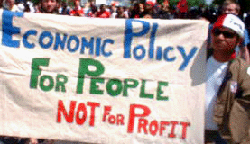
Monkey-Wrenching the Globalization Gang
I went to Bretton Woods, but all I got was this lousy t-shirt. Amazingly, it's not a 'one size fits all' and it's not full of holes.
Walking through the Mount Washington Hotel in Bretton Woods two years ago, in the New Hampshire mountain resort and official birthplace, in July 1944, of the International Monetary Fund (IMF), the World Bank, and of plans for an international trade organization - eventually embodied by the General Agreement on Tariffs and Trade (GATT)/World Trade Organization (WTO), I thought about the genocide of Indigenous Peoples in that part of the USA, now called "New England", perpetrated by Puritans and other settlers who viewed them, as historian Douglas Leach put it, as a "graceless and savage people, dirty and slothful in their personal habits, treacherous in their relations with the superior race fit only to be pushed aside and subordinated"(i).

